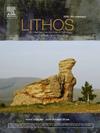西藏拉萨中部次地层泽农群火山岩成岩学说:狮泉河-嘉黎四叠纪剪状南向俯冲的地球动力学影响
IF 2.9
2区 地球科学
Q2 GEOCHEMISTRY & GEOPHYSICS
引用次数: 0
摘要
拉萨中部次地层中生代火山岩分布广泛,其成因机制一直备受争议。我们利用地质年代学、元素地球化学和Hf同位素等手段,系统研究了拉萨中亚热带东-中段蚌那藏布和当惹雍错西部地区增荣组火山岩的成因和动力机制。增荣组火山岩主要由安山岩、白云岩和流纹岩组成,显示出独特的地球化学特征。在当惹雍错和蚌那藏布地区,安山岩、辉绿岩和流纹岩显示出中高K钙碱性特征。这些岩石的微量元素分布具有相似性,Rb、U、Th、Pb 和 K 元素富集,而 Nb、Ta、Ti、Ba 和 Sr 元素贫化。锆石UPb年代测定显示,当惹荣措和本那藏布地区火山岩的年龄分别为127-126Ma和112-103Ma。此外,锆石UPb年龄的分布表明,在禅农组和石泉河-嘉黎缝合带中,锆石UPb年龄呈西东向年轻化趋势。安山岩、闪长岩和流纹岩的εHf(t)值均低于软玉标准线,在0至-15之间,地壳模型年龄在2.0至1.2 Ga之间。我们的数据与地质环境、全岩地球化学、Hf同位素和地质年代相结合,表明禅农群火山岩是石泉河-嘉黎洋俯冲形成的地幔楔熔体与拉萨地层下部地壳混合,并经历闪长石和斜长石分块结晶的结果。我们认为,在向南俯冲的过程中,石泉河-嘉黎洋是自西向东以剪刀状的方式依次闭合的。本文章由计算机程序翻译,如有差异,请以英文原文为准。
Petrogenesis of the Zenong Group volcanics in the central Lhasa subterrane, Tibet: Geodynamic implications of the scissor-like southward subduction of the Shiquanhe-Jiali Tethyan Ocean
The widespread Mesozoic volcanics in the central Lhasa subterrane have been a subject of debate concerning their genetic mechanisms. Leveraging geochronology, element geochemistry, and Hf isotopes, we have systematically investigated the origin and dynamic mechanisms of the Zenong Group volcanics in the Bengnazangbu and western Dangreyongcuo areas in the east-middle part of the central Lhasa subterrane. Comprising primarily of andesites, dacites, and rhyolites, the Zenong Group volcanics display distinct geochemical signatures. In the Dangreyongcuo and Bengnazangbu areas, the andesite, dacite, and rhyolites show medium to high-K calc-alkaline characteristics. These rocks share similarities in trace element distribution, exhibiting enrichment in Rb, U, Th, Pb, and K, but depletion in Nb, Ta, Ti, Ba, and Sr. These characteristics accord with the typical composition of arc volcanic rocks. Zircon U![]() Pb dating has revealed that the volcanic rocks in the Dangreyongcuo and Bengnazangbu areas have ages of 127–126 Ma and 112–103 Ma, respectively. Further, the distribution of zircon U
Pb dating has revealed that the volcanic rocks in the Dangreyongcuo and Bengnazangbu areas have ages of 127–126 Ma and 112–103 Ma, respectively. Further, the distribution of zircon U![]() Pb ages suggests a west-east younging trend both in the Zenong Group and the Shiquanhe-Jiali suture zone. The εHf(t) values of andesite, dacite, and rhyolite are all below the chondrite standard line, ranging from 0 to −15, and the crustal model ages range from 2.0 to 1.2 Ga. Our data, combined with the geological setting, whole-rock geochemistry, Hf isotopes, and geochronology, suggest that the Zenong Group volcanic rocks are the result of the mixing of mantle wedge melts formed by the subduction of the Shiquanhe-Jiali Ocean with the lower crust of the Lhasa terrane, and undergoing fractional crystallization of amphibole ad plagioclase. And we believe that the Shiquanhe-Jiali Ocean was sequentially closed from west to east in a scissor-like fashion during southward subduction.
Pb ages suggests a west-east younging trend both in the Zenong Group and the Shiquanhe-Jiali suture zone. The εHf(t) values of andesite, dacite, and rhyolite are all below the chondrite standard line, ranging from 0 to −15, and the crustal model ages range from 2.0 to 1.2 Ga. Our data, combined with the geological setting, whole-rock geochemistry, Hf isotopes, and geochronology, suggest that the Zenong Group volcanic rocks are the result of the mixing of mantle wedge melts formed by the subduction of the Shiquanhe-Jiali Ocean with the lower crust of the Lhasa terrane, and undergoing fractional crystallization of amphibole ad plagioclase. And we believe that the Shiquanhe-Jiali Ocean was sequentially closed from west to east in a scissor-like fashion during southward subduction.
求助全文
通过发布文献求助,成功后即可免费获取论文全文。
去求助
来源期刊

Lithos
地学-地球化学与地球物理
CiteScore
6.80
自引率
11.40%
发文量
286
审稿时长
3.5 months
期刊介绍:
Lithos publishes original research papers on the petrology, geochemistry and petrogenesis of igneous and metamorphic rocks. Papers on mineralogy/mineral physics related to petrology and petrogenetic problems are also welcomed.
 求助内容:
求助内容: 应助结果提醒方式:
应助结果提醒方式:


